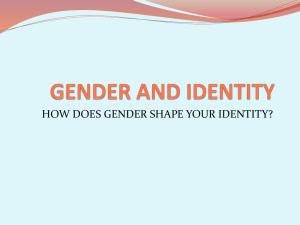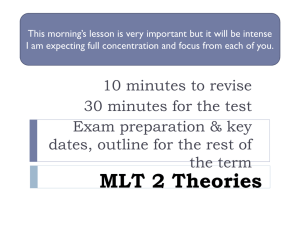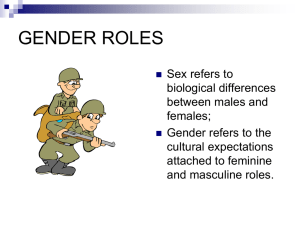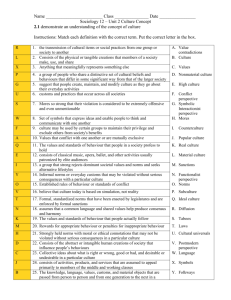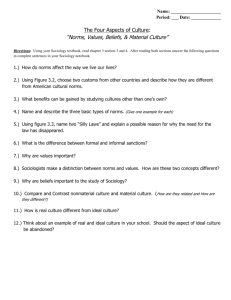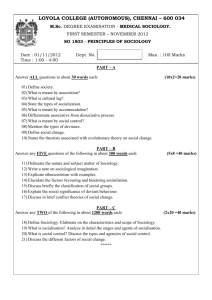introduction to sociology
advertisement
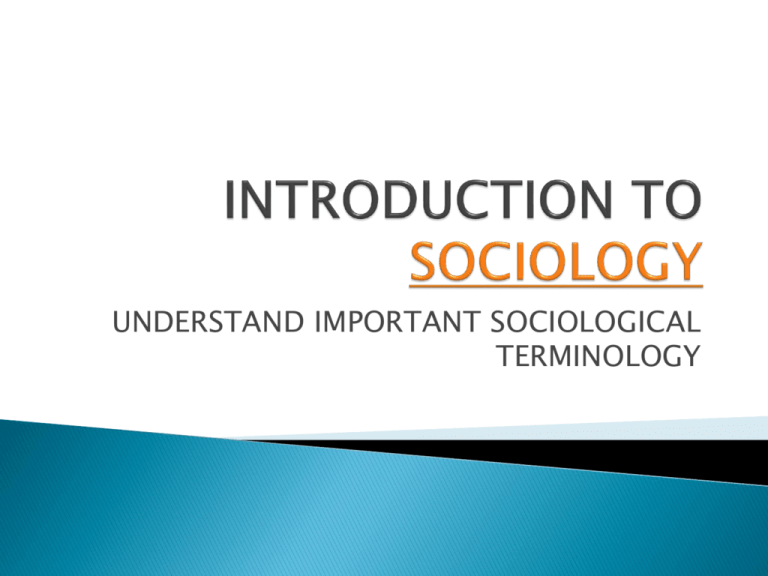
UNDERSTAND IMPORTANT SOCIOLOGICAL TERMINOLOGY On your tables create a mind map of any key words you can think of associated with Sociology/society (6 mins) Sociology is the study of Society But what is Society??? In pairs draw your version of society on your A3 paper However you both decide There is no right or wrong I will be collecting them in at the end. (10 minutes) What did you include? On your picture label any; Systems – S EG -Health, education, welfare... Interactions – I EG - Exchanges between people – waving, buying something in a shop, Write down your own definition of ‘Society’ Now list the following words in your notes Leave space between each word so that you can make notes on each Norms Values Beliefs Customs Status Role Discuss the meanings of each of them on your table These are widely accepted beliefs that something is worthwhile and desirable. For example, most societies place a high value on human life. Examples of British values include fair play, democracy, free speech, tolerance, property, love, family life etc. What values do you hold? Create an individual mind map of your values. (10 mins) Norms are values put into practice. They are specific (but often unwritten) rules of behaviour that apply to specific social situations. Examples include ‘rules’ about how to eat, how to dress or how to speak to people in certain situations. There are also norms that govern how we are supposed to behave according to our gender. Customs are traditional and regular forms of behaviour associated with specific social situations. For example, in Britain people celebrate Bonfire night by setting off fireworks and they eat pancakes on Shrove Tuesday. A person’s status is their position society. There are different types of status: 1. Ascribed statuses – these are fixed at birth usually by biology or inheritance e.g. your gender or race. 2. Achieved statuses – these are statuses over which individuals have control and which are attained through education, jobs, marriage etc. Society expects those of a certain status to behave in a particular way. A set of norms will be associated with that status. This set of norms is known as a role. For example, the role of ‘doctor’ is accompanied by cultural expectations about patient confidentiality and professional behaviour. Culture is defined as the ‘way of life’ of a social group. Every culture is a blend of beliefs, attitudes, values, expectations and ways of thinking, feeling and behaving. Culture is: 1. SHARED – it forms the basis of a society by binding individuals together, enabling them to communicate and cooperate. 2. LEARNED – we are not born with culture, we learn it. This learning process is called SOCIALISATION. A group of people within society who share norms, values, beliefs and attitudes that are in some ways different from mainstream culture. Norms Values Beliefs Customs Status Role Socialisation Society Culture Subculture Socialisation – The process by which an individual learns or internalises the culture of society. Society – An organised group of individuals living as members of a community Culture- All those things that are learnt and shared by a society or group of people and transmitted from generation to generation through socialisation. Subculture- A group of people within society who share norms, values, beliefs and attitudes that are in some ways different from mainstream culture. Primary Socialisation Secondary Socialisation Social order Social institutions Sanctions Social control Social construction Identify & describe a subculture within our society FINAL DEADLINE: Wednesday 19th September 9am Explain the meaning of the term culture Complete the exam question and hand it to me as you exit SOCIOLOGY VOCAB TEST In your groups work together to write down the definitions for the key terms we looked at last lesson Everyone in the class gained between 2-4 marks Key pointsCulture is BOTH learnt and shared T- use more/explain sociology terminology P- Point is unclear Q- Points made do not answer the question E- Use more examples As discussed earlier, we are not born with culture. We learn it through the SOCIALISATION PROCESS. This is the lifelong process through which individuals learn and internalise the norms and values of their culture. It has TWO STAGES. 0-5 years old. The family is the AGENT OF PRIMARY SOCIALISATION. Learn language and basic norms and values. Often learnt through IMITATION OF ROLE MODELS such as parents or older siblings. Parents may use SANCTIONS (rewards or punishments) to reinforce approved behaviour and punish deviant (norm-breaking) behaviour. ‘Feral children’ can be used to illustrate the importance of primary socialisation… http://www.youtube.com/watch?v=ipt0pjz0m wg&feature=related From 5 years old and up – it is a lifelong process. Agents of secondary socialisation include: - schools - peer group - the mass media - religion - workplace Here, we learn more complex and specific norms and values. In your group read through the item and highlight any sociological terminology Discuss what each of the key terms mean, make notes – annotate your sheet Work together to write a detailed answer to the question, use as many sociological terms as you can When you do use sociological terms make sure you show that you know what they mean eg – ......norms, rules of behaviour,...... Having constructed your answer you are going to mix groups and share your knowledge with your new group members DON’T JUST DICTACT YOU ARE NOW THE EXPERT YOU NEED TO EXPLAIN Mind map how you might answer the section b) Q. Explain the meaning of the term primary socialisation Explain the meaning of the term secondary socialisation (5 marks) 2 teams 1 person from each team come to sit on the hot seat The rest of the team need to work together to explain the key term which appears on the screen You have 1 minute before the other team 1 minute to continue http://www.youtube.com/watch?v=N2Blh9Ky djA Having constructed your answer you are going to mix groups and share your knowledge with your new group members DON’T JUST DICTACT YOU ARE NOW THE EXPERT YOU NEED TO EXPLAIN Mind map how you might answer the section b) Q. It is really important that you take the time and read through your work and analyse it yourself so that you know how to improve it. With reference to the item explain the meaning of the term primary socialisation – 5 marks; 1)Must explain the term socialisation (Learn norms & values) 2) explain primary socialisation (before school 0-4, family main agent...) 3)Must have a sentence that makes a link to the item. With reference to the item explain the meaning of the term secondary socialisation (5 marks) 5 marks; 1)Must explain the term socialisation (Learn norms & values) 2) explain secondary socialisation (Begins when they start school, life long process, various different agents of socialisation school, work, mass media as well as family ) 3)Must have a sentence that makes a link to the item. Label your file dividers as follows; 1)Assessment Everyone should have; 2)Culture & Identity 3)Theories Sociology handbook 4)Family – Types 5)Family – Trends Sociology dictionary 6)Family –Diversity Social Sciences intervention 7)Family – Theory sheet 8)Family-Policy 9) Folder check sheet 10) Folders £1 please Please see me if you are missing anything SOCIOLOGY VOCAB TEST Individually work together to write down the definitions for the key terms from this week EXTENSION Add any others you know Norms – Acceptable behaviour Values – These are widely accepted beliefs that something is worthwhile and desirable. Beliefs Something a person is convinced of as true Culture Culture is defined as the ‘way of life’ of a social group. Status A persons position in society Role Social expectations of suitable behaviour for status’ Achieved statusStatus gained through education or marriage Ascribed statusStatus fixed at birth usually by biology or inheritance Socialisation process by which we learn norms & values Primary socialisation 0-4/5 basic norms and values. Secondary socialisation 4/5 years old and up – it is a lifelong process Subculture A group that deviates slightly from the norms and values of a particular culture To recap on Sociological vocab. To make sure everyone has a clear understanding of the course and the behaviour expected of them in this classroom To discuss the view that human behaviour is the role of nature (our inherited biological make up) or nurture (socialisation) I want you ALL to enjoy your lessons I want you ALL to like/love this subject I want you ALL to pass your exam For these reasons there are some things I will ask from you- I want you ALL to enjoy your lessons I want you ALL to like/love this subject I want you ALL to pass your exam NO HANDS UP – 20% of the class answer 80% of the questions. I want everyone to think about every question I ask then I will ask someone to feedback DISCUSSION – There is a great amount of research that proves that when we discuss things with others it helps us understand and remember. Explaining things to others is the most effective way of ensuring you fully understand and remember. Respect yourself and everybody in this room – no put downs of other people based on their race, religion, ethnic back-ground, skin colour, native language, gender, sexual preference, intelligence, body shape, or body size. Those characteristics are not chosen by people; we are born with them. Criticizing or insulting people for things beyond their control is not fair and will not be tolerated in this classroom If you disagree with a comment somebody has made or think their behaviour is cruel, say ‘I disagree’ or ‘I think your behaviour is cruel’ do not insult the other person. There are many, many forms of prejudice, and most of us have our own opinions and ideas about the world. You are entitled to believe and think whatever you choose. You are not entitled, however, to express your opinions in a manner that may insult, degrade, embarrass, hurt or humiliate other people. The nature view of human behaviour suggests that all behaviour is caused by our genetic make up. The genes that we inherited from our parents So in the same way that we are born male or female, we are born with a blue print (a framework) to behave in a certain way The nurture view of human behaviour suggests that all behaviour is the result of interactions with the environment. Our experiences throughout life; our socialisation as well as life events. The nurture view sees the individual as being born as an empty vessel, and is filled up with the experiences they gain from their environment How much of our behaviour is due to nature? How much is due to nurture? Watch this clip and think about this social – psychological debate http://www.youtube.com/watch?v=5ivNjCdK m04&feature=relmfu John Barryman Class discussion – Rules DO NOT TALK OVER PEOPLE Whoever is holding the dice is the one who is talking Put your hand up if you would like to speak next I will chair the discussion so decide who will be the next to talk You may throw the dice to the next person the speak BUT if anyone throws it in an inappropriate way – too hard, deliberately in the opposite direction etc then we will stop. Identify & describe a subculture within our society Eg’s Goths Skaters Chavs FINAL DEADLINE: Wednesday 19th September 9am Disney clip Insert link 2 minutes per person, to explain as many key words as you can from the envelope Timer Gender socialisation & gender equality Masculinities/Feminities We learn many norms and values through this process, including those associated with being male or female. The process of acquiring one’s gender identity is called GENDER ROLE SOCIALISATION. We are going to look at the role of the mass media as an agent of gender role socialisation. http://www.youtube.com/watch?v=qsy3BblcjCA Why do women shave their arms and legs? Why is rugby seen to be a man’s sport? Why don’t men wear dresses?
